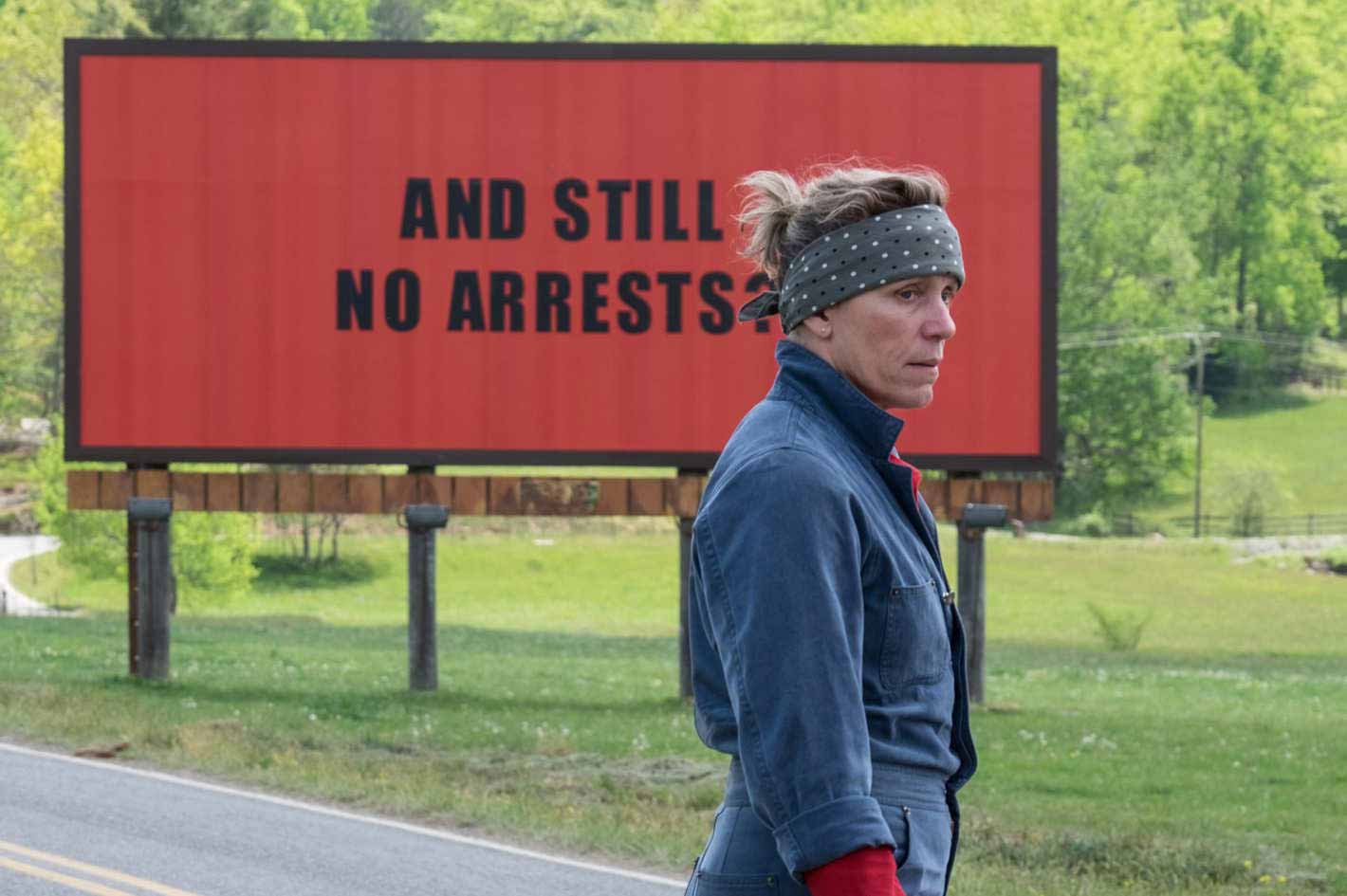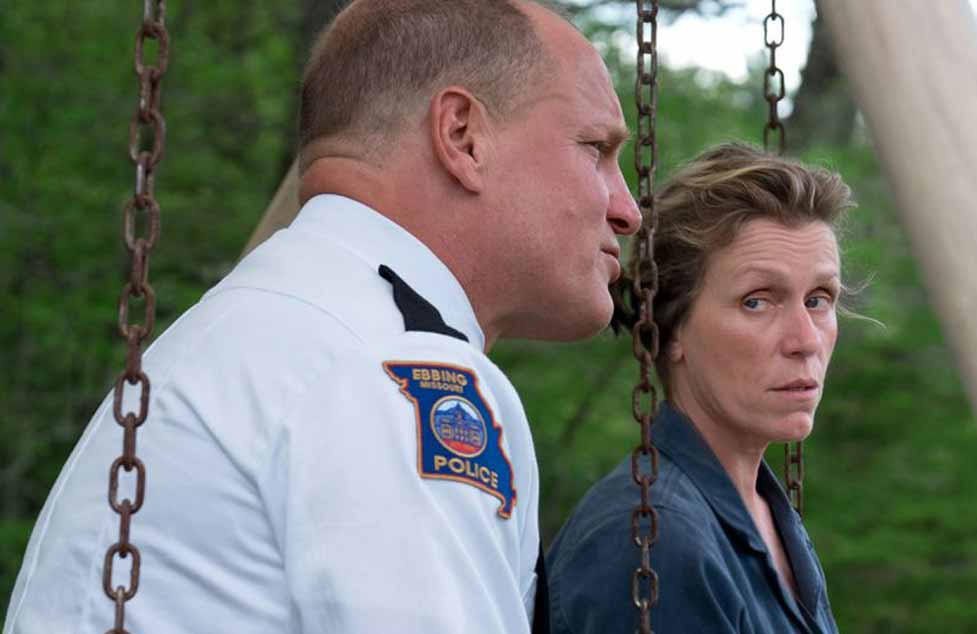Early in Martin McDonagh’s Three Billboards Outside Ebbing, Missouri, a woman named Mildred Hayes (Frances McDormand) pays a business call on Red Welby (Caleb Landry Jones), a young man who runs a small agency that rents out advertising space along the nearby country roads. Months before, Mildred’s daughter was murdered, and the grieving mother has lost patience with the police’s failure to solve the crime. She has decided to send a message via three billboards that will say, in black letters against a red background, one after the next: “Raped while dying”; “And still no arrests?”; “How come, Chief Willoughby?” Mildred hopes that these bold reminders—impossible to ignore, especially after she is interviewed on the local TV news—will shame the cops out of their torpor and inspire them, in the absence of a conclusive DNA match, to try harder, perhaps, as she suggests, even to take blood from every man in the county over the age of eight.
By the final scene, a great quantity of blood will have been splashed across the screen, yet despite the impressive amount of mayhem and gore on view, Three Billboards is an unusually literary film. McDonagh, who began his career as a playwright, and whose previous films include Seven Psychopaths (2012) and the brilliant In Bruges (2008), is intensely concerned with language. In fact, Three Billboards is partly about the power of language—specifically, the outrage and havoc caused by the few words that Mildred chooses to display.
During Mildred’s first meeting with Red, they discuss which colloquial and medical terms for body parts and sexual intercourse cannot be bannered in public, and throughout the film, there are questions and debates about vocabulary and phraseology: why the police must now say “person of color” rather than using an old-fashioned racist epithet; whether a vapid young woman could really have said “begets” (as in “anger begets more anger”) when she seems not to know the difference been “polo” and “polio”; if a dwarf named James (Peter Dinklage) should bother correcting the ignorant folk who keep referring to him as a midget. The first encounter between an aggressive deputy called Dixon (Sam Rockwell) and the black police chief (Clarke Peters) who has been brought in to run the squad turns on a stupid joke about whether one of them has said “hard of hearing” or “hard of reading.” And when Mildred rants at the local minister who urges her to take down the billboards, she hammers at him by repeating the word “culpable.” Like the LA street-gang members who are considered legally “culpable” for the actions of their fellow Crips and Bloods, the preacher, she insists, is “culpable” for the crimes of his gang members—priests anywhere who have molested altar boys.
Early on, the film acknowledges its literary debts. Just before Mildred’s first conversation with Red begins, we may notice (if we are looking closely) that Red is reading a book by Flannery O’Connor. It’s by no means a casual or accidental choice. One feels O’Connor’s spirit hovering over the film, and not only because, like her fiction, it is set in the rural South and leavens a deep seriousness with broad and often grotesque humor: a horrific and hilarious scene in a dentist’s office recalls precisely how O’Connor allows her characters to reach the boiling point—and boil over. McDonagh shares many of O’Connor’s preoccupations: obsession, fanaticism, eccentricity, violence, physical deformity, the lifelong legacy of guilt that can result from a family conflict, and the unexpected, even shocking ways in which the faithless can stumble upon redemption. Like O’Connor, he denies his characters an easy entry into a state of grace. McDonagh prefers to suggest the possibility of grace, and he makes it clear, as O’Connor does, that salvation, even partial salvation, requires thought, work, and struggle.
For Mildred, that struggle is complicated by the fact that her chosen antagonist, Chief Willoughby (Woody Harrelson), is a profoundly decent, intelligent, hard-working, and conscientious man who has done everything in his power to solve the baffling case. In addition, the whole town knows that the police chief is dying of cancer, and their love and respect for him supersedes the reserve of sympathy that Mildred is rapidly forfeiting with her relentless, alienating fury. Among the most extraordinary aspects of McDormand’s virtuosic performance is her willingness to let us see how rage, grief, borderline poverty (Mildred works in a gift shop selling ceramic bunnies), and recklessness can ravage one’s appearance. There’s a great beauty in Mildred’s determination and her ferocious bravery, and in the purity of McDormand’s choice of art and truth over glamour and vanity.
Advertisement
We anticipate that Willoughby will die before the film’s end, though we may be startled by the way in which his death occurs. In any case, he prepares for it by leaving three letters—one for his wife, one for Mildred, and one for Dixon—that we hear him read in voice-over, so that they function as three long monologues. Not only are the letters beautifully written and deeply affecting, but each, though different from the others, is also a sort of love letter. He tells his wife the things that, he hopes, will allow her to go on without him. He reassures Mildred about how hard he’s tried to find her daughter’s killer, and offers her a sort of promise or prophecy that will, by the film’s end, turn out to be at least half true. And he tells the violent, hotheaded Dixon (whom we have seen administering a brutal beating) that what he needs in order to fulfill his dream of becoming a detective is love. Ultimately, it’s Dixon’s acknowledgment of this need that moves Three Billboards toward its perfectly low-key, perfectly ambiguous, and satisfying ending.
Although McDonagh makes no mention of the political climate beyond Ebbing, it’s hard not to see the film as a reflection of our dark current moment and as a comment on the resentment and rage simmering inside so many Americans; on the widespread sense that those in power (especially the police) are not working in our interests; and on the dissolution of community, of public trust, of tolerance and civility. Yet the film’s conclusion offers some faint hope. After the final scene, in which Mildred and Dixon agree to consider acting with mercy, thought, and forbearance, the audience with whom I watched the film—on a wintry Saturday afternoon, in a sold-out theater in downtown Manhattan—burst into grateful applause.
Martin McDonagh’s Three Billboards Outside Ebbing, Missouri is now in theaters.



